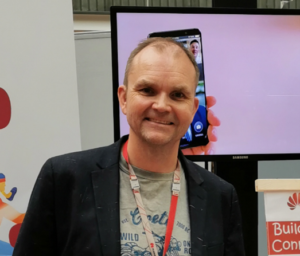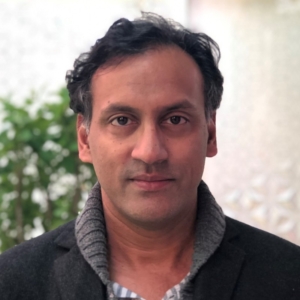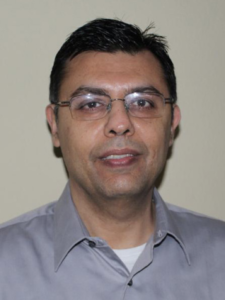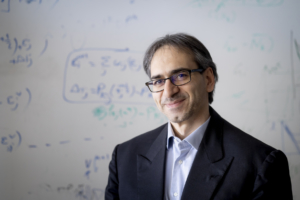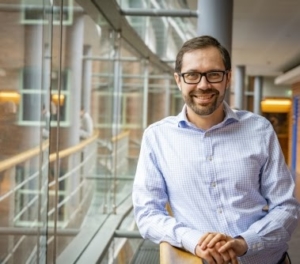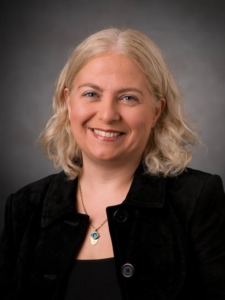SPAWC 2024 is hosting the following keynotes, focusing on hot topics in signal processing for wireless communications, and to be held in the Plenary room:
Keynote 1: Towards the Quantum internet: Entanglement meets classical communications
Speaker: Angela Sara Cacciapuoti (University of Naples Federico II, Italy)
Wednesday Sept. 11, 9:00 – 9:45
Keynote 2: Radio localization and sensing towards 6G: The carrier pendulum swing
Speaker: Henk Wymeersch (Chalmers University of Technology, Sweden)
Wednesday Sept. 11, 11:15 – 12:00
Keynote 3: Wireless renaissance: AI’s transformative role in PHY
Speaker: Sharad Sambhwani (Apple Inc., USA)
Thursday Sept. 12, 9:00 – 9:45
Keynote 4: Understanding power consumption in next-generation wireless receivers
Speaker: Sundeep Rangan (New York University, USA)
Thursday Sept. 12, 11:15 – 12:00
Keynote 5: Emerging 6G wireless: Challenges and opportunities at base station and terminal sides
Speaker: Mattias Gustafsson (Huawei Technologies Sweden AB, Sweden)
Thursday Sept. 12, 14:00 – 15:00
Keynote 6: Statistical inference over networks: Decentralized optimization meets high-dimensional statistics
Speaker: Gesualdo Scutari (Purdue University, USA)
Friday Sept. 13, 9:00 – 9:45
Keynote 7: Semantic communication networks: The next frontier for 6G and beyond
Speaker: Aylin Yener (Ohio State University, USA)
Friday Sept. 13, 11:15 – 12:00
Wireless renaissance: AI’s transformative role in PHY
Abstract: In recent years, we have seen AI heralding a new era of innovation for the PHY of wireless communications. AI provides a profound shift in the philosophy of PHY problem-solving, transitioning from model-driven approaches to data-driven and their combination. It intrigues us to ask “will AI empowered techniques instigate a ‘renaissance’ for wireless PHY?” In this keynote, we attempt to answer this question by exploring the transformative role of AI for PHY. We will delve into motivations and opportunities of AI for PHY, the view of PHY transitioning towards AI/ML, and the ongoing efforts to integrate AI to wireless communications. We envision native-AI integration is a way to propel PHY to a new level of performance, reliability and efficiency through our two preliminary examples, privacy modulation coding and end-to-end learning without back-propagation (forward-forward learning). Lastly, we conclude the talk by discussing a few challenges of this topic from the perspectives of compute, model and dataset.
Bio: Sharad Sambhwani is an experienced wireless systems engineer. He is currently part of Cellular Systems Engineering in Hardware Technologies department at Apple since 2019 working on cellular modem development while also leading a R&D team working on next generation wireless technologies. He is currently the Vice-Chair of pre-6G SDOs (ATIS NGA Technology, ETSI ISG THz) and rapporteur of ETSI ISG RIS MIMO work item. He actively participated in 3GPP RAN1/2/4 from 1998 to 2012 and was a founding member of TIP 5G ORAN project group and active member of TIP mmW project group. He also has extensive experience in the development of advanced cellular modem algorithms and features. Prior to joining Apple, Sharad began his career as Member of Technical Staff in the Advanced Technology department at Bell Labs, Holmdel, NJ in 1996. He later had stints at a couple of startups, Algorex (acquired by National Semiconductors) and Quicksilver Technology followed by a 17 year tenure at Qualcomm Technologies, Inc. He received his MS and Ph.D. degree in EE from Polytechnic University, Brooklyn, NY (now NYU) in 1992 and 1997 respectively and a MS in CS (AI/ML) from UIUC in 2020. He is a named inventor on over 200 granted patents and has authored 13 publications.
Statistical inference over networks: Decentralized optimization meets high-dimensional statistics
Abstract: The interest in solving large-scale statistical learning problems within decentralized networks is rapidly increasing, particularly in systems where data is distributed across network nodes without centralized coordination, often referred to as “mesh” networks. Inference from massive datasets presents critical challenges at the intersection of computational and statistical sciences, particularly ensuring the quality of the performed analytic when computational resources, like time and communication, are constrained. While the trade-offs between statistical accuracy and computational efficiency have been extensively studied in centralized settings, our comprehension in the context of mesh networks remains underdeveloped. Specifically, (i) distributed schemes that perform effectively in classical low-dimensional regimes can fail in high-dimensional scenarios, and (ii) existing convergence analyses may not accurately predict algorithmic behavior, with empirical tests often contradicting theoretical findings. This discrepancy arises primarily because most decentralized algorithms have been developed and analyzed primarily from an optimization perspective, neglecting the statistical aspects. This talk will present novel analyses and decentralized algorithm designs through various vignettes from high-dimensional statistical inference, aiming to integrate statistical considerations into decentralized optimization. By adopting this new perspective, some long-standing myths in the literature of distributed optimization will be demystified.
Bio: Gesualdo Scutari is a Chair Professor with the School of Industrial Engineering and Electrical and Computer Engineering at Purdue University, West Lafayette, IN, USA. His research interests include continuous (distributed, stochastic) optimization, equilibrium programming, and their applications to signal processing and statistical learning. Among others, he was a recipient of the 2013 NSF CAREER Award, the 2015 IEEE Signal Processing Society Young Author Best Paper Award, and the 2020 IEEE Signal Processing Society Best Paper Award. He serves as an IEEE Signal Processing Distinguish Lecturer (2023-2024). He served on the editorial broad of several IEEE journals, and he is currently an Associate Editor of SIAM Journal on Optimization. He is a fellow of IEEE.
Radio localization and sensing towards 6G: The carrier pendulum swing
Abstract: The evolution of mobile communications systems, from 3G onwards, has consistently pushed the boundaries of technology into higher carrier frequencies to harness increased bandwidth and, consequently, greater data capacity. This progression has not only revolutionized communication but also significantly enhanced positioning technologies. Since the 3GPP’s 16th release, the integration of positioning services has become increasingly critical, evolving alongside each generation of mobile technology. As the world transitions from 4G to 5G, and now edges towards 6G, the quest for frequencies capable of meeting the rigorous demands of extreme positioning accuracy and innovative sensing capabilities intensifies. This talk delves into the exploration of these new frequency bands, evaluating their impact and utility from a positioning and sensing perspective. We will analyze the roles of various frequency bands—from below 10 GHz, traversing through the 28 GHz landmark of 5G, and venturing into the sub-THz bands anticipated (by some) in 6G—before circling back to reassess the value of lower frequencies. This presentation aims to shed light on the models, methods, and potential challenges that lie ahead in the pursuit of accuracy and resolution in radio localization and sensing technologies.
Bio: Henk Wymeersch obtained the Ph.D. degree in Electrical Engineering/Applied Sciences in 2005 from Ghent University, Belgium. He is currently a Professor of Communication Systems with the Department of Electrical Engineering at Chalmers University of Technology, Sweden. Prior to joining Chalmers, he was a postdoctoral researcher from 2005 until 2009 with the Laboratory for Information and Decision Systems at the Massachusetts Institute of Technology. Prof. Wymeersch served as Associate Editor for IEEE Communication Letters (2009-2013), IEEE Transactions on Wireless Communications (since 2013), and IEEE Transactions on Communications (2016-2018) and is currently Senior Member of the IEEE Signal Processing Magazine Editorial Board. During 2019-2021, he was an IEEE Distinguished Lecturer with the Vehicular Technology Society. Since 2024, he is a Fellow of the IEEE. His current research interests include the convergence of communication and sensing, in a 5G and Beyond 5G context.
Semantic communication networks: The next frontier for 6G and beyond
Abstract: 6G and beyond systems will rely heavily on ubiquitous wireless connectivity. The ever-increasing demand on wireless resources necessitates finding innovative ways for networked communications for the next generation applications. A recent direction in this realm is semantic communications. This new paradigm diverges from the classical communications in that, instead of requiring to reliably communicating messages sent from the transmitter, the requirement is to recover the meaning of the messages sent. This relaxation renders new design insights and allows for better resource management while ensuring that the goal of the transmission is met. In this talk, we will cover the basics of the semantic communications paradigm and demonstrate recent work that provide resource savings relying on pretrained models as well as new transceiver design architectures for semantic communication networks that are AI-native and are expected to be the building block for 6G and beyond. We will conclude with future directions in this area.
Bio: Aylin Yener is the Roy and Lois Chope Endowed Chair in Engineering at The Ohio State University since 2020, and a professor at the Departments of Electrical and Computer Engineering, Computer Science and Engineering, and Integrated Systems Engineering. Prior to this, she was a Distinguished Professor of Electrical Engineering and Dean’s Fellow at Penn State, where she joined in 2002 as an assistant professor. In 2008-2009, she was a visiting associate professor in the electrical engineering department at Stanford University, CA and in 2016-2017 she was a visiting professor in the same department. She also held a visiting appointment at Telecom Paris Tech in Paris, France in 2016. She received her PhD and MS degrees in Electrical and Computer Engineering from Wireless Information Networks Lab (WINLAB), Rutgers University, and her BS degrees in Electrical and Electronics Engineering and in Physics from Bogazici University. Her expertise is in wireless communications, information theory, and AI, with recent focus on various pillars of 6G including new advances in physical layer designs, semantic communications, edge learning/computing/AI, system design for confluence of sensing, communications, distributed learning, energy conscious networked systems, and security and privacy. Yener received the 2020 IEEE Communication Theory Technical Achievement Award, 2019 IEEE Communications Society Best Tutorial Paper Award, 2018 IEEE Women in Communications Engineering (WICE) Outstanding Achievement Award, 2014 IEEE Marconi Paper Award, and several other research and technical awards. She is a fellow of the IEEE and a member of the Science Academy of Turkey.




